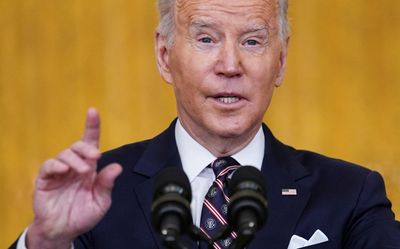President Joe Biden took to the airwaves Tuesday to address Americans about Russian aggression in Ukraine, warning that Russian President Vladimir Putin intends to “carve out a big chunk of Ukraine.” Putin deployed forces to the Donbas overnight, and on Tuesday said these newly "independent" regions extend deeper than the two republics he recognized on Monday, including areas under the jurisdiction of the Ukrainian government. “He’s setting up a rationale to go much further,” Biden said.
In response to the Russian moves, and in coordination with western allies, Biden is imposing sanctions he says go far beyond those imposed in 2014, when the Kremlin annexed Crimea and stoked a separatist conflict in eastern Ukraine. The new measures include full blocking sanctions on two large state-owned Russian banks, VEB and Russia’s military bank, as well as new restrictions on Russia’s sovereign debt.
“That means we’ve cut off Russia’s government from Western finance,” he said. “It can no longer raise money from the West and cannot trade in its new debt on our markets or European markets either.”
Biden also said that certain Russian elites and their family members will also be targeted with sanctions because they benefit from the “corrupt gains of the Kremlin’s policies.”
The German-Russian Nord Stream 2 pipeline will also not move forward, Biden said. Should Russia push further into Ukraine, Biden warned that Moscow would pay an even steeper price.
Meanwhile, America will provide defensive assistance to Ukraine while reassuring the NATO allies. Because Russia has now said it is not removing its troops from Belarus, Biden is sending US forces and equipment to strengthen America’s Baltic allies, including Lithuania, Latvia, and Estonia.
“We have no intention of fighting Russia,” Biden said, but noted that we “will defend every inch of NATO territory.”
More For You
Most Popular
In this "ask ian," Ian Bremmer analyzes Trump’s recent meeting with Zelensky and how close (or far) Russia and Ukraine are from a peace deal.
Syrian President Ahmed al-Sharaa attends the military parade of the Syrian army in Umayyad Square in central Damascus to mark the one-year anniversary of the fall of the Assad regime, on Dec. 8, 2025.
A year ago this month, Syria’s brutal dictatorship collapsed. There are signs of recovery, but sectarian violence threatens to undermine the optimism.
